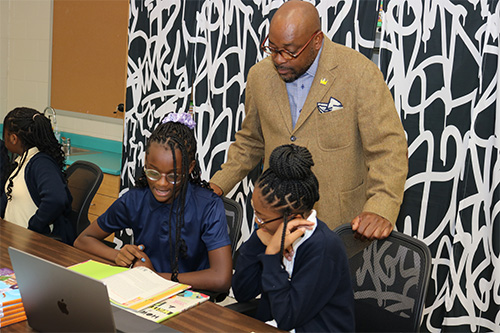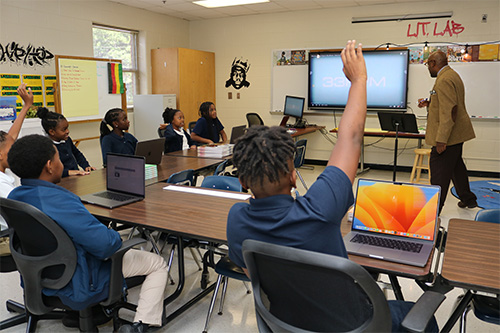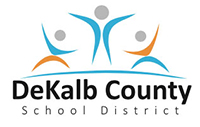
 As hip-hop celebrates its 50th anniversary, many students enjoy listening to modern hip-hop but lack knowledge about its pioneering history. Andre Mountain, the principal of Marbut Traditional Theme School, is committed to changing that and enhancing his students’ literacy abilities in the process.
As hip-hop celebrates its 50th anniversary, many students enjoy listening to modern hip-hop but lack knowledge about its pioneering history. Andre Mountain, the principal of Marbut Traditional Theme School, is committed to changing that and enhancing his students’ literacy abilities in the process.
Principal Mountain and his team have successfully founded the Hip Hop Literacy Laboratory, based on the HipHopEX Laboratory at Harvard University. It’s a classroom emphasizing literacy-based activities inspired by African-American literature and arts-based learning. The students are immersed in creative writing, book studies, and other educational opportunities that Hip-Hop arts can offer. The ultimate goal of the Hip Hop Literacy Laboratory is to provide graduate and local high school students with a platform to explore and experiment with the vast potential of Hip-Hop arts in various educational settings.
The lab is an excellent place for students and teachers to come together and delve into topics such as literacy, urban and youth culture, and social justice. As Principal Mountain explained, through engaging in discussions, reading relevant materials, and creating art, everyone can benefit from a collaborative and educational experience.
“Hip-hop is modern poetry; it’s literature, and we want to capitalize on what interests students. Many of our students are drawn to and fascinated with hip-hop culture,” said Mountain. “As a school, we see that as an opportunity to increase student engagement and augment what’s in the curriculum. So, we fill the curriculum with things that will bring it to life for students.”
 The lab’s inception dates to last year as students returned to school following the COVID-19 pandemic closures. The school’s staff sought an effective way to reignite the students’ love for reading. This lab concept presented a promising opportunity to increase student engagement. With that simple premise, an unused classroom was transformed into a vibrant space decorated with posters and artwork celebrating hip-hop artists.
The lab’s inception dates to last year as students returned to school following the COVID-19 pandemic closures. The school’s staff sought an effective way to reignite the students’ love for reading. This lab concept presented a promising opportunity to increase student engagement. With that simple premise, an unused classroom was transformed into a vibrant space decorated with posters and artwork celebrating hip-hop artists.
“When we look in this classroom, you see a representation of urban culture, the African American experience all around the room,” said Mountain. “That’s what we wanted for our kids—a lab where they can create, make mistakes, have discussions and debates. It’s not a regular class; it’s something very untraditional at a traditional theme school.”
Educators are encouraged to take advantage of the opportunity to register their students for a visit to the lab. They have the option to lead the lesson themselves or enlist the help of another teacher. The media center assistant is also available to assist students with their literacy needs. Throughout this experience, students will gain valuable insights into the history of hip-hop and refine their artistic abilities. They also have the chance to analyze the lyrics of well-known hip-hop artists from Atlanta, providing a comprehensive learning opportunity with a local flare.
“Atlanta artists are talking about real social issues—the life of a young person growing up in metro Atlanta,” said Mountain. “We don’t want just to honor what was created in the Bronx with the founding of hip-hop, but also honor the stamp that Atlanta has put on hip-hop culture.”
Fifth-grade students London Christen and Jase Kurtz enjoy what the Hip Hop Literacy Laboratory offers.
“I enjoy it because we get to learn more about hip-hop. When you research what hip-hop means, it won’t tell you the real meaning,” said London. “You have to learn and experience it yourself.”
“I love Black history, and Black people created hip-hop,” said Jase. “So, I love coming to the lab. I love learning about hip-hop. It’s really cool.”
According to Principal Mountain, the lab aims to encourage other schools to create distinctive learning spaces that foster student innovation and learning.
“The goal is to inspire other schools to think about their curriculum and what you might be able to offer,” he said. “It might not be a hip-hop lab but something that will ignite a student’s desire to go deeper into subjects that they’re learning.”


